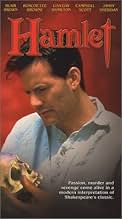A tragédia clássica de Shakespeare é revisada nos Estados Unidos na virada do século XX.A tragédia clássica de Shakespeare é revisada nos Estados Unidos na virada do século XX.A tragédia clássica de Shakespeare é revisada nos Estados Unidos na virada do século XX.
- Direção
- Roteiristas
- Artistas
- Direção
- Roteiristas
- Elenco e equipe completos
- Produção, bilheteria e muito mais no IMDbPro
Avaliações em destaque
All interpretations are valid to some respect, I suppose, but some choices the director makes end up radically altering the flow of the play; and any choice that REQUIRES excising 'inconvenient' bits of the text must be considered an alteration of the playwright's intent, rather than an interpretation. A few comments:
1) Campbell Scott's portrayal was quite good; he played Hamlet quietly and intensely rather than explosively, which is fair enough. But the decision to underplay other characters came off less well. For instance, Claudius barely seemed upset at all during his "My offense is rank" soliloquy. THIS was a soul in torment? (But bland Claudii are a pet peeve of mine.) And Gertrude, in her closet, often seemed unperturbed that she'd just seen her son kill a man. And most of all, having Laertes give his "That drop of blood which is calm proclaims me bastard!" speech in a controlled, subdued manner is basically an oxymoron. On the other hand, keeping the emotional level low was effective in creating an atmosphere of tension and creepiness throughout, rather than one of high drama and spectacle.
2) Nonetheless, POLONIUS IS A COMIC CHARACTER!!! To play him straight, with unrelenting quiet dignity, changes the whole tone of the first half of the play. You're SUPPOSED to laugh through the first two acts, to set you up for the shift that comes in with "The Mousetrap" and culminates in Polonius's death. Polonius, like Mercutio in "Romeo and Juliet", is a representation of Comedy itself, and his death marks the point from which there's no escape from tragedy. I see nothing gained by stripping Polonius of his laughs, and much lost (including, if nothing else, our simple AFFECTION for the character).
3) Another pet peeve: I own 6 "Hamlets" on DVD, 4 of them substantially 'complete', and yet EVERY SINGLE ONE OF THEM cuts Hamlet's observation: "This is the imposthume of much wealth and peace, which inward breaks and gives no outward show why the man dies" (said upon seeing the forces of Norway headed for Poland). This line is VITAL, because it is Hamlet's value judgment on Fortinbras; this is the line that shows that Fortinbras is a yob. As Hamlet admires the Player's capacity for passion while recognizing the absurdity of his concern "for Hecuba", so does he admire Fortinbras' boldness while recognizing the absurdity of wasting 2,000 men and 20,000 ducats "for a straw." And if it's not made clear that Fortinbras is an absurdity, then the irony of Hamlet's turning-over of Denmark to him at the end of the play is lost... (end of rant)
On the whole, if you're familiar with 'Hamlet' already I would say that this might be an interesting addition to your viewing inventory, but I would NOT recommend it as your first encounter with the work.
1) Campbell Scott's portrayal was quite good; he played Hamlet quietly and intensely rather than explosively, which is fair enough. But the decision to underplay other characters came off less well. For instance, Claudius barely seemed upset at all during his "My offense is rank" soliloquy. THIS was a soul in torment? (But bland Claudii are a pet peeve of mine.) And Gertrude, in her closet, often seemed unperturbed that she'd just seen her son kill a man. And most of all, having Laertes give his "That drop of blood which is calm proclaims me bastard!" speech in a controlled, subdued manner is basically an oxymoron. On the other hand, keeping the emotional level low was effective in creating an atmosphere of tension and creepiness throughout, rather than one of high drama and spectacle.
2) Nonetheless, POLONIUS IS A COMIC CHARACTER!!! To play him straight, with unrelenting quiet dignity, changes the whole tone of the first half of the play. You're SUPPOSED to laugh through the first two acts, to set you up for the shift that comes in with "The Mousetrap" and culminates in Polonius's death. Polonius, like Mercutio in "Romeo and Juliet", is a representation of Comedy itself, and his death marks the point from which there's no escape from tragedy. I see nothing gained by stripping Polonius of his laughs, and much lost (including, if nothing else, our simple AFFECTION for the character).
3) Another pet peeve: I own 6 "Hamlets" on DVD, 4 of them substantially 'complete', and yet EVERY SINGLE ONE OF THEM cuts Hamlet's observation: "This is the imposthume of much wealth and peace, which inward breaks and gives no outward show why the man dies" (said upon seeing the forces of Norway headed for Poland). This line is VITAL, because it is Hamlet's value judgment on Fortinbras; this is the line that shows that Fortinbras is a yob. As Hamlet admires the Player's capacity for passion while recognizing the absurdity of his concern "for Hecuba", so does he admire Fortinbras' boldness while recognizing the absurdity of wasting 2,000 men and 20,000 ducats "for a straw." And if it's not made clear that Fortinbras is an absurdity, then the irony of Hamlet's turning-over of Denmark to him at the end of the play is lost... (end of rant)
On the whole, if you're familiar with 'Hamlet' already I would say that this might be an interesting addition to your viewing inventory, but I would NOT recommend it as your first encounter with the work.
This film has a lot of problems. It looks made for TV; it is overlong; the transposition to of the plot to 19th century America makes no sense. But the real weakness of the film is Cambell Scott.
The popularization of Freudian psychoanalysis has made it very easy to read Hamlet as neurotic; and very easy, too, to read his relationship with his mother as "Oedipal" fixation. Consequently, some readings of Hamlet have the whole play revolve around the question of whether Hamlet is mad, or just neurotic (and with good reason to be upset at his Step-dad).
All this should only remind us that Freudianism is a terrible trivialization of human personality.
If the reader really needs a one-sentence reduction of Hamlet it is this: Both Hamlet's father and his uncle-stepfather are barbarian bullies from Hell, and Hamlet is trying very hard not to be.
Notice that Mom of Denmark doesn't really show up in this equation. Nor does the avoidance of Hell seem to be an overly neurotic concern (certainly not for an Elizabethan).
Scott gives us a 20th century post-Freudian Hamlet. Of course the complex morality of the piece gets entirely lost.
Everybody here tries hard, but it's just not convincing.
The popularization of Freudian psychoanalysis has made it very easy to read Hamlet as neurotic; and very easy, too, to read his relationship with his mother as "Oedipal" fixation. Consequently, some readings of Hamlet have the whole play revolve around the question of whether Hamlet is mad, or just neurotic (and with good reason to be upset at his Step-dad).
All this should only remind us that Freudianism is a terrible trivialization of human personality.
If the reader really needs a one-sentence reduction of Hamlet it is this: Both Hamlet's father and his uncle-stepfather are barbarian bullies from Hell, and Hamlet is trying very hard not to be.
Notice that Mom of Denmark doesn't really show up in this equation. Nor does the avoidance of Hell seem to be an overly neurotic concern (certainly not for an Elizabethan).
Scott gives us a 20th century post-Freudian Hamlet. Of course the complex morality of the piece gets entirely lost.
Everybody here tries hard, but it's just not convincing.
I collect Hamlets. My premise is it doesn't have to be an uncut "eternity" version to get a good score. This is the best Hamlet I have on my shelf. At 3 hrs (vs the uncut 4), it's just right - not much lost, & a whole lot better than the 2 hr versions.
Campbell Scott plays Hamlet as a man teetering on the brink of insanity. The amazing thing is that he does this in a generally quiet way. He doesn't depend on yelling or racing around to form the character.
Bar none, I have never seen a better Horatio than John Benjamin Hickey. Author Kurt Vonnegut referred to Horatio as a "sane & decent man," & that's exactly how Hickey plays him. He's loyal but softly outspoken, a wonderful contrast to Rosencrantz & Guildenstern. Watch him in the last few moments of his Prince's life as he gently rocks Hamlet in his arms.
This version avoided two of my pet peeves: Ophelia is not jail bait & Gertrude really was old enough to be Hamlet's mother. It makes me crazy when a 30 year old Hamlet has a 15 yr old Ophelia & a 35 yr old Mom! All in all, this one of the best composite casts I've seen. The approach is definitely different from versions that are more physical (Mel Gibson) or "faithful" to the Bard (Nicol Williamson), but when I first saw this I fell in love with everything except the annoying piano score. There are bits of action unique to this production that will make you catch your breath. I won't give you the details; don't want to ruin the surprises.
Enjoy!
Campbell Scott plays Hamlet as a man teetering on the brink of insanity. The amazing thing is that he does this in a generally quiet way. He doesn't depend on yelling or racing around to form the character.
Bar none, I have never seen a better Horatio than John Benjamin Hickey. Author Kurt Vonnegut referred to Horatio as a "sane & decent man," & that's exactly how Hickey plays him. He's loyal but softly outspoken, a wonderful contrast to Rosencrantz & Guildenstern. Watch him in the last few moments of his Prince's life as he gently rocks Hamlet in his arms.
This version avoided two of my pet peeves: Ophelia is not jail bait & Gertrude really was old enough to be Hamlet's mother. It makes me crazy when a 30 year old Hamlet has a 15 yr old Ophelia & a 35 yr old Mom! All in all, this one of the best composite casts I've seen. The approach is definitely different from versions that are more physical (Mel Gibson) or "faithful" to the Bard (Nicol Williamson), but when I first saw this I fell in love with everything except the annoying piano score. There are bits of action unique to this production that will make you catch your breath. I won't give you the details; don't want to ruin the surprises.
Enjoy!
Hamlet set in the pre-Civil War American South (more or less). Claudius, looks vaguely like a recent US president and talks with an Arkansas drawl. Polonius and Ophelia are Black; Polonius is the mansion's major-domo. Rosencrantz & Guildenstern dress, look, and talk like a couple of Mafiosi. The Ghost is a hoot. Hamlet, who speaks with a Midwestern accent, tends to mumble a bit
The text is straight Shakespeare--not a scene or even a line seems to be missing.
The strange thing about this pastiche is that it's engaging and actually works.
The text is straight Shakespeare--not a scene or even a line seems to be missing.
The strange thing about this pastiche is that it's engaging and actually works.
Usually, Americans playing Shakespeare make a hash of the language - see "Much Ado About Nothing" with Keanu Reeve and Robert Sean Leonard for unassailable proof. In this version of "Hamlet", though, Campbell Scott's unassuming, straightforward delivery of some of Shakespeare's most challenging lines is almost flawless. It is not that the American accent is unsuited to dealing with Elizabethan English, it seems, but the tradition of allowing the language to speak for itself is usually lacking with American actors. They seem to need to imbue everything with their own idea of what the character's emotional state should be, which the language, if it is powerful enough, should be able to do all by itself. As a result of seeing this version of "Hamlet", I have had to rethink completely my prejudices about Americans playing Shakespeare.
Você sabia?
- ConexõesVersion of Le duel d'Hamlet (1900)
Principais escolhas
Faça login para avaliar e ver a lista de recomendações personalizadas
Detalhes
Contribua para esta página
Sugerir uma alteração ou adicionar conteúdo ausente

































